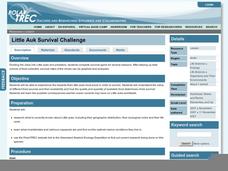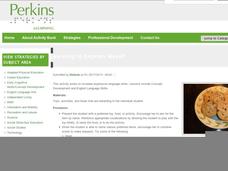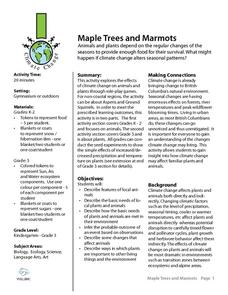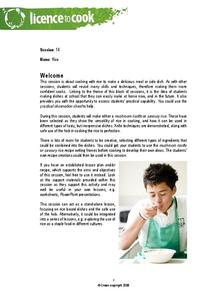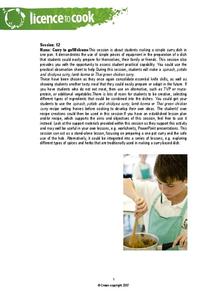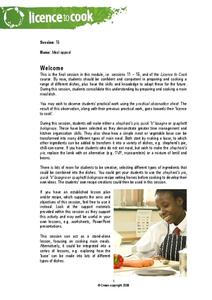Curated OER
Food and Fiber: Helping the Environment and You
Fourth graders explore the many uses of corn-based products and the importance of water resources. They consider how biodegradable products help to keep water clean. They perform experiments to observe how corn pellets dissolve while...
Polar Trec
Why Can’t I Eat This Fish?
Can turning on the television lead to toxins in the food supply? The lesson offers an opportunity for young scientists to complete guided research. A worksheet lists each question as well as the web page necessary to answer the question....
Curated OER
Culinary Culture
Welcome to the café! Introduce beginning French speakers to food-related vocabulary and using the conditional tense to place an order. This plan gets your kids up and moving. They look at French menus, identify quantity expressions (like...
Curated OER
Bering Sea Buffet - A Foodweb Activity
Life in the Bering Sea, food webs, and the ocean ecosystem are introduced with a map activity. The lesson starts as kids explore maps and images of the Bering Sea, then it kicks into high gear as they start to discuss the types of...
Curated OER
Little Auk Survival Challenge
A bird's life is one of danger and intrigue as it struggles for survival in sometimes harsh environments. To understand how difficult surviving in the wild can be, children play a simulation game where they act as little auks, birds from...
Polar Trec
Animal Monitoring Introduction
Not only do mealworms taste great, they are also great for classroom science lessons. In pairs, young scientists observe and record what they see as they check out what their mealworms are doing from minute to minute. Each minute...
Curated OER
Bug Snack
Students create an insect out of food. In this insect characteristics lesson, students review the 3 body parts of an insect and use various foods to create a sample insect. Students learn a song about insect body parts.
Perkins School for the Blind
Learning to Express Myself
Expressing one's wants and needs is vital for learners of any age or ability level. Young children with visual impairments and intellectual disabilities practice asking for preferred items, foods, or activities in a structured manner....
Curated OER
Water is Life
Krill is a very small ocean animal that is key to keeping the ocean ecosystem going. The class reviews food webs and chains, learns about the importance of krill, discusses krill anatomy, builds a model of a krill, and then has a...
True Blue Schools
Now, We’re Cooking!
Practice nutritional cooking with a collection of fun meal preparation lessons. Each lesson includes a focus, objective, collaborative activity, and recipe to culminate what young cooks have learned about healthy eating.
Curated OER
Recycling and Composting
Young scholars set up composting sites that allow food scraps and paper to be recycled by nature. They are introduced to one aspect of recycling; composting. Students see how God recycles as the worms change garbage into something that...
It's About Time
Energy Flow in Ecosystems
Emerging biochemists more fully understand the flow of energy in ecosystems as they explore the laws of thermodynamics and relate them to energy transfer in food chains. They also investigate heat loss from the human body and how...
Kenan Fellows
Microorganisms in Pond Water
That is living in the water? Groups of two to three view pond water with microscopes in order to find microorganisms. They draw pictures of the ones they find in their slides. The groups compare their drawings to pictures of common...
Polar Trec
Nature's Density Column
Nature provides density columns in the polar regions that provides food for many animals. Young scientists build their own density columns with water in order to answer analysis questions. Through a slideshow presentation, scholars...
Curated OER
Plankton Parade
Plankton isn't just a tiny cartoon character, it's also a very important food source for animals around the world. Budding scientists discuss the types and functions of plankton, including where they are found, how they are caught, and...
Wild BC
Maple Trees and Marmots
Kinesthetic activities simulate animal activity as the seasons progress in a lesson that introduces climate change to primary pupils. The kids role-play maple trees collecting what they need to survive, but as each year comes...
National Park Service
Living & Non-Living Interactions
What better way to learn about ecosystems than by getting outside and observing them first hand? Accompanying a field trip to a local park or outdoor space, this series of collaborative activities engages children in...
Food a Fact of Life
Soup-er!
Is there anything better than hot soup on a cold day? Kids prepare either vegetable chowder or minestrone soup in an activity that features the use of the stove top.
Food a Fact of Life
Rice
Mushroom risotto or savory rice? Class cooks craft clever and creative dishes that demonstrate the versatility of this popular grain.
Food a Fact of Life
Stir-Fry Crazy!
Sizzling stir-fry. Fajitas. Yum. Stove-top cooking is the focus of this activity designed for young cooks.
Food a Fact of Life
Curry to Go!
Spinach, potato, and chickpea curry, lamb korma, Thai green chicken curry. Class groups mix up a variety of dishes featuring this versatile spice.
Food a Fact of Life
Meal Appeal
To demonstrate their mastery of time management and kitchen organization skills, groups prepare either a shepherd's pie, lasagne, or spaghetti bolognese.
Food a Fact of Life
Creative Crumbles
Class cooks practice the rubbing technique and the preparation of a range of bases to produce an apple and sultana or herby veggie crumble.
MENSA Education & Research Foundation
Ecosystems
Explore the Earth's different ecosystems through four lessons, an assessment, and extension activities. Lessons include informative text and step-by-step instructions to apply knowledge in interactive, and thought provoking ways; such as...






